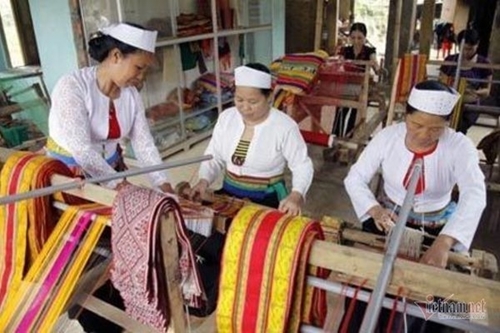In addition, the ethnic minority people are provided with vocational training to meet the human resource demands, contributing to the hunger eradication and poverty reduction in the localities.
    |
 |
|
Brocade weaving in Hoa Binh (Photo for illustration: vietnamnet.vn) |
However, the vocational training has met several difficulties due to objective restrictions such as geographical and social conditions.
However, many localities have implemented flexible solutions to link vocational training goals with job creation, bringing in practical results in vocational training for ethnic minority laborers.
Over the past time, thousands of people have attended agricultural and non-agricultural vocational training classes, through which they have gained confidence in developing their family economy, even going abroad to work.
Many provinces and cities have focused their resources on improving the quality of vocational training in line with job creation, helping people gain a sustainable livelihood.
Vocational training for rural laborers, especially for those in remote communes, has been enhanced in Yen Bai province.
For example, in Yen Binh commune, Yen Binh district, the main income of locals comes from planting grapefruit trees. Due to the people’s lack of knowledge in applying technical advantages to production, the effectiveness of their crops is low. However, after joining training courses organized by the district’s Division of Labor, Invalids and Social Affairs, they have acquired more knowledge to take care the trees and improve productivity.
Under the Decision 1956/QD-TTg issued by the Prime Minister, the province has provided vocational training for over 29,000 rural laborers. The employment rate after training courses is over 80 percent.
After finishing their training courses, many laborers have applied the knowledge to developing economy, contributing to improving productivity, saving production cost and creating new jobs for others.
The localities have been asked to improve information dissemination to raise awareness of rural laborers, especially the ethnic minority people, on the importance of vocational training. Thereby, they should build a suitable structure of jobs to meet the requirements of the labor market, contributing to fostering socio-economic development and completing the target of building new-styled rural area in each locality.
Translated by Trung Thanh